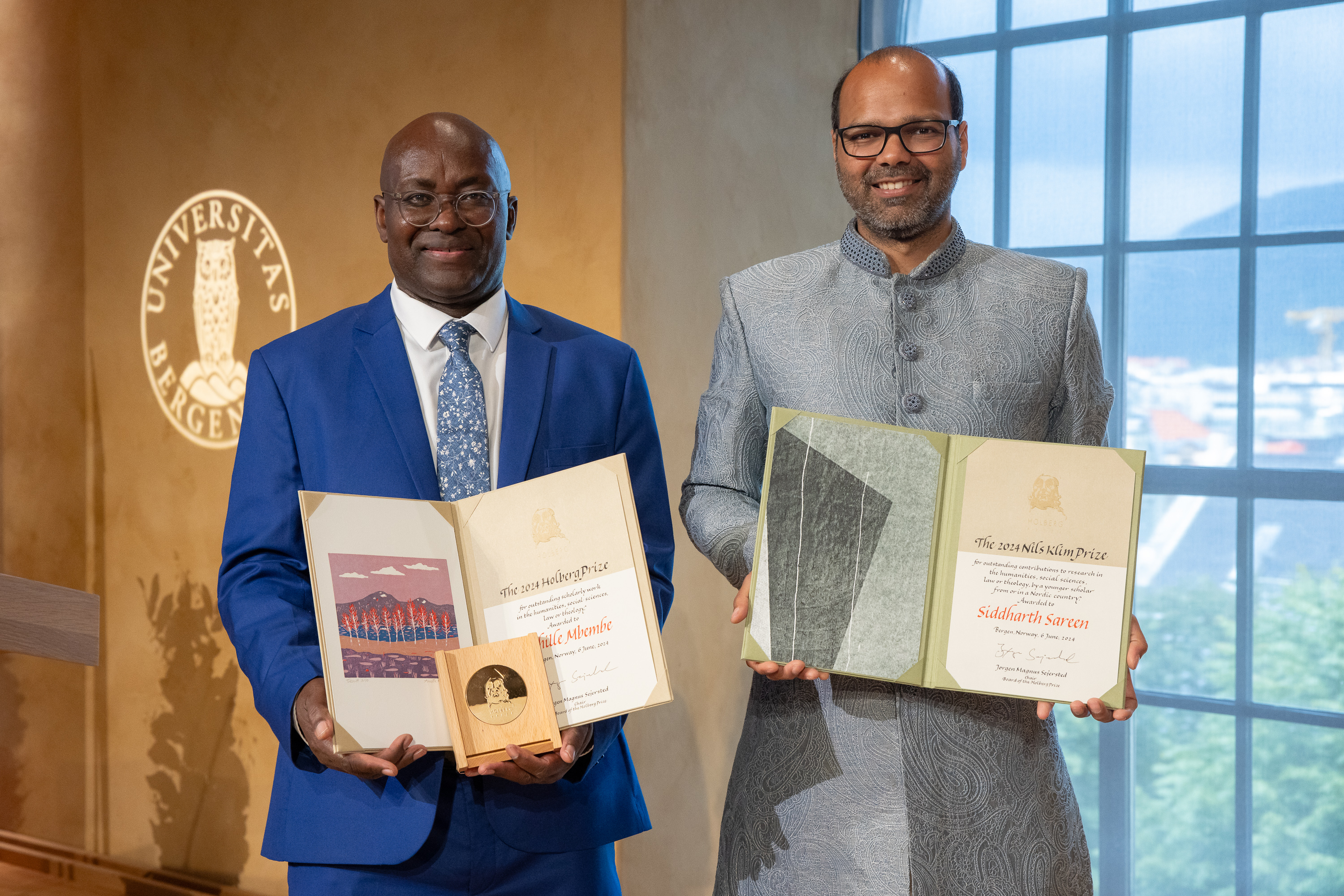The Holberg Prize and the Nils Klim Prize Conferred

Today, Norwegian Minister of Research and Higher Education Oddmund Hoel conferred the Holberg Prize upon Achille Mbembe and the Nils Klim Prize upon Siddharth Sareen.
At a prestigious award ceremony today in the University Aula in Bergen, Professor Achille Mbembe of the University of the Witwatersrand received the international research award from Norway’s Minister of Research and Higher Education Oddmund Hoel.
The Holberg Prize is worth NOK 6 million (approx. EUR 525,000) and is awarded annually for outstanding contributions to research in the humanities, social sciences, law or theology.
Expressing his deepest gratitude for the award, Mbembe referred to late Holberg Laureate Bruno Latour, when declaring that “the problems that have come to me over the years might have relevance to you as well.” “In my case”, Mbembe continued, “most of the ‘problems that have come to me over the years’ had ‘Africa’ as their name and their face.”
Moving Away From an Ethnocentric Cul-de-sac
Mbembe receives the prize for his pioneering research in African history, postcolonial studies, humanities, and social science over four decades. Both as an academic and as a public intellectual, he is known for his ability to bridge existing thinking on colonialism and decolonisation with pressing questions on topics such as contemporary migration regimes, global citizenship, restitution and reparation, technology, climate change and planetary futures.
In his acceptance speech, Membe used a biblical image when he referred to Africa as “the stone which, for so long, was rejected by the builders” in the conversation about how to deal with issues of cohabitation and our relation to the Earth and to each other.
“It may well be that in turning this rejected stone into one of the cornerstones of the common home we strive to build, things in their infinite probabilities might suddenly look different”, said the Laureate. “Maybe for the first time in the history of the human race, thinking our relations to each other through our relation to Africa might finally pave the way to the new ethics of sharing and repairing the Earth we are striving for.”
Mbembe also described how power is now shifting from the human to the technological, and how “reason is increasingly subsumed by instrumental rationality”. “’To decolonize’ must start from the assumption that knowledge cannot be reduced to computational information processing”, he said. “We must recover the ability to think because neither calculation alone, nor computation are sufficient for explaining life, let alone for ensuring ours and the planet’s durability.”
The Nils Klim Prize conferred upon Siddharth Sareen
Also today, the Norwegian Minister of Research and Higher Education conferred the Nils Klim Prize upon environmental social scientist Siddharth Sareen. This prize is worth NOK 500,000 and is awarded annually to a young scholar who has excelled in one of the research areas covered by the Holberg Prize. The recipient must be from, or working in, a Nordic country and under the age of 35 at the time of the nomination deadline.
Siddharth Sareen is professor of energy and environment at the Department of Media and Social Sciences, University of Stavanger, Norway. He is also professor II at the Centre for Climate and Energy Transformation, University of Bergen. Sareen receives the award for his research at the intersection between social sciences, the humanities, and technological and environmental sciences.
The Nils Klim Laureate expressed his gratitude and stressed that he did so with the acknowledgement that the award “recognises achievements that stem from collective endeavour and collaborative commitment.”
“Our society today remains in the grip of fossil fuels and our embodied memory of a world reliant on them”, said Sareen. “Renewable energy sources offer us better, more responsible ways of living at lower cost, yet we are all too slow in our embrace of these solutions, in the face of the urgent climate challenge”, he continued and pointed out that his field of research seeks to identify pathways along which to act and to develop tools to equip society to transform.
In his speech, Minister Oddmund Hoel extended his warmest congratulations to the two Laureates and thanked them for directing attention towards some of the greatest struggles of our time. “When shaping our future, we need the perspectives which question the narratives that have always been told”, he said. “And in the very centre of this questioning, we find this year’s Laurates.”
About the Holberg Laureate
Achille Mbembe is research professor of history and politics at the Wits Institute for Social and Economic Research (WISER), University of the Witwatersrand, Johannesburg, South Africa. He is also the Director of the Innovation Foundation for Democracy. He was educated in Cameroon and in France where he obtained his PhD in History at the Université Paris 1 Panthéon-Sorbonne and a a Diplôme d'études approfondies (DEA) at the Institut d'études politiques de Paris.
Mbembe has taught at various universities in the United States, including Columbia University, the University of Pennsylvania, the University of California at Berkeley and at Irvine, Yale University, Duke University and Harvard University. A winner of the Ernst Bloch Award and the Gerda Henkel Prize, he is a member of the American Academy of Arts and Sciences and a Fellow of the British Academy.
Mbembe holds Honorary Doctorates from the Paris 8 University (France), the Catholic University of Louvain (Belgium) and the University of Bergen (Norway). His work has been translated in 17 languages (English, Spanish, Italian, German, Dutch, Portuguese, Arabic, Danish, Swedish, Norwegian, Turkish, Romanian, Polish, Slovenian, Catalan, Finnish, and Mandarin). His latest book is La communaute terrestre (Editions La Découverte, Paris, 2023).
Visit our press pages for photos, biography, Committee citation, expert contact information, and more.